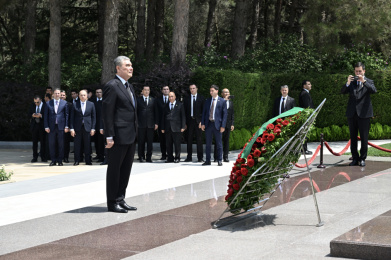Bridges of Opportunity: Education as the Foundation of Turkmen–Chinese Partnership
17.07.2025 | 23:30 |“Zhōngguó” – this is how the Chinese refer to their country, meaning “Central Kingdom.” The term captures not only a historical and geographical view of China’s role in the world, but also its current position as a centre attracting talented young people from all over the globe – including Turkmenistan.
Turkmen–Chinese cooperation is rooted in a long-standing history. Diplomatic relations between Turkmenistan and the People’s Republic of China were established in 1992. Since then, we have witnessed steady and consistent development in bilateral engagement, including the work of the intergovernmental commission and close cooperation within the diplomatic track.
On the international stage – particularly within the United Nations, where China is a permanent member of the Security Council – the positions of our two countries align on many key issues, especially those concerning the promotion of peace, stability, and non-interference in the internal affairs of sovereign states.
Active cooperation is also underway within the “Central Asia + China” format and in the framework of the Shanghai Cooperation Organisation (SCO), whose summit will take place this year on 31 August in the city of Tianjin, where Turkmenistan is expected to participate.
Tianjin is a city I know well. It was there that my personal journey with China began, as I completed a preparatory Chinese language course at Tianjin Normal University. That experience marked a major academic and personal milestone for me. I saw with my own eyes the remarkable progress of a country that has become one of the engines of the global economy, science, and education.
Today, China is not only an economic superpower, but also one of the most attractive destinations for high-quality education, especially for Turkmen youth.
Currently, more than 3000 Turkmen students are pursuing their studies at various universities across China. In my view, this is a strong testament to the high level of trust and interest that China’s education system inspires among Turkmen students and their families. Young people from Turkmenistan are choosing to study in Chinese cities where modern technologies, academic rigour, and a rich cultural heritage go hand in hand.
One area of cooperation that I would particularly like to highlight is in the field of medicine, especially the partnership between the State Medical University of Turkmenistan and the Beijing University of Traditional Chinese Medicine. This is more than an educational exchange – it is a deep convergence of traditions and approaches. Traditional Chinese medicine is among the oldest in the world, and its integration with modern medical techniques offers exciting new prospects for Turkmen specialists.
A key aspect of our growing humanitarian partnership is also the teaching of Chinese in Turkmen schools and universities. This, I believe, is a natural extension of our expanding bilateral ties.
The language of a partner is not merely a tool of communication – it is a pathway to mutual understanding, respect, and trust. As one of the official languages of the United Nations, Chinese has the potential to become a bridge to new opportunities. I am confident that it is already opening doors for many of my compatriots.
I am convinced that the future of Turkmen–Chinese relations will be even more multifaceted and meaningful, particularly if we continue to invest in human capital, expand academic exchange, develop joint degree programmes and promote collaborative research initiatives.
The young generation of Turkmenistan – open to the world and fluent in the languages of our partners – is already becoming a reliable bridge of friendship between Ashgabat and Beijing.
Jumadurdy POTJIMOV











